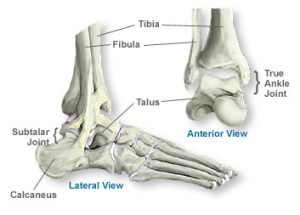Peroneal Tendon Repair
 Soft tissue structures that connect muscle to bone, tendons play a part in many different areas of the body. The foot and ankle anatomy contains four peroneal tendons, two on each foot. One peroneal tendon located on the outside of the foot with the other peroneal tendon located at the ankle area. Physicians may also refer to the peroneal tendons using the terms peroneus brevis and peroneus longus. Peroneal tendons work to keep the foot and ankle in a balanced position and stop the foot from rolling inwards or inverting. Due to the location and stress put on the peroneal tendons, the peroneal tendons often get injured.
Soft tissue structures that connect muscle to bone, tendons play a part in many different areas of the body. The foot and ankle anatomy contains four peroneal tendons, two on each foot. One peroneal tendon located on the outside of the foot with the other peroneal tendon located at the ankle area. Physicians may also refer to the peroneal tendons using the terms peroneus brevis and peroneus longus. Peroneal tendons work to keep the foot and ankle in a balanced position and stop the foot from rolling inwards or inverting. Due to the location and stress put on the peroneal tendons, the peroneal tendons often get injured.
Conservative Treatment for Peroneal Tendon Injury
Physicians typically try conservative treatment before opting for surgical treatment. Conservative treatment includes rest, ice, and physical therapy. Foot and ankle physicians may also order orthotics for the patient to wear in their shoes or perform treatments like ultrasound injections or massage. If conservative treatment does not work or the injury to the peroneal tendon remains too severe, then the surgeon ops for surgery.
Surgical Repair of the Peroneal Tendon
The surgical approach depends on the training and education of the treating physician along with the type of injury and severity of the injury. All surgeries regarding the peroneal tendons start with the anesthesiologist placing the patient under general anesthesia. With a patient under general anesthesia, the patient does not feel any of the surgery and remains asleep throughout the entirety of the procedure.
If the patient has had a perennial tendon subluxation, the surgeon creates a small Incision which deepens the area on the fibula at the tendons location. This allows the tendons to stay in place and the retinaculum ligament also get repaired.
If the injury involves inflammation of the membrane of the tendon, the treating physician may perform a synovectomy. A synovectomy procedure involves removing the inflamed and damaged membrane of the tendon.
If the tendon has fraying but no severe damage, the physician may simply shave off or debride the damaged areas of the peroneal tendon. In the case that surgeon deems the damage to the tendon too severe to replace, the surgeon replaces the peroneal tendon. To replace the peroneal tendon, the surgeon uses either an allograft or an autograft. The autograft typically comes from the Achilles tendon. The surgeon then uses screws or staples to attach the new aspect of the peroneal tendon. Do not confuse with a posterior tibial tendon repair.
Following Peroneal Tendon Repair
Following peroneal tendon repair surgery, the treating physician prescribes the patient with a physical therapy protocol. Each surgery varies from case to case resulting in each doctor having their own specific protocol for the patient to follow.
To view a list of all insurances that AOA Orthopedic Specialists accept, click HERE. To schedule an appointment online, click HERE.


